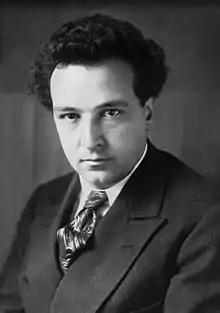Pacific 231
Pacific 231 is an orchestral work by Arthur Honegger, written in 1923. Honegger was widely known as a train enthusiast, and once notably said: "I have always loved locomotives passionately. For me they are living creatures and I love them as others love women or horses."[1]
| Pacific 231 | |
|---|---|
| Orchestral music by Arthur Honegger | |
 The composer in 1928 | |
| Other name | Mouvement Symphonique |
| Composed | 1923 |
It is one of his most frequently performed works.
Description
The popular interpretation [2] of the piece is that it depicts a steam locomotive, one that is supported by the title of the piece alongside film versions. Honegger, however, insisted that he wrote it as an exercise in building momentum while the tempo of the piece slows. He originally titled it Mouvement Symphonique, only giving it the name Pacific 231, a class of steam locomotive designated in Whyte notation as a 4-6-2, with four pilot wheels, six driving wheels, and two trailing wheels (the French, who count axles rather than wheels, call this arrangement 2-3-1) after it was finished.[3]
Orchestration
The orchestra consists of: 2 flutes, piccolo flute, 2 oboes, English horn, 2 clarinets, bass clarinet, 2 bassoons, contrabassoon – 4 French horns, 3 trumpets, 3 trombones, tuba, – 4 percussionists (tenor drum, cymbal, bass drum, tam tam) – strings.
Pacific 231 is the first in Honegger's series of three symphonic movements. The other two are Rugby and Mouvement Symphonique No. 3. Honegger lamented that his "poor Symphonic Movement No. 3 paid dearly for its barren title." Critics generally ignored it, while Pacific 231 and Rugby, with more evocative titles, have been written about in depth.
In film
A 1949 award-winning French film, Pacific 231, directed by Jean Mitry, used the orchestral work as the sound track for a tribute to the steam locomotive, and included close-up footage of driving wheels, running gear and railroad operations, mostly taken at speed, and cut/choreographed to the music.[4][5]
References
- ^ Honegger, Arthur (1951), trans. Clough, Wilson O. and Willman, Allan Arthur (1966). I am a Composer. London: Faber and Faber Ltd.
- ^ Study score, Salabert, Paris, (1924)
- Specific
External links
- The 1949 Cannes-winning film on Internet Archive
- The 1931 Russian version on YouTube
- Pacific 231 (1949) on IMDb